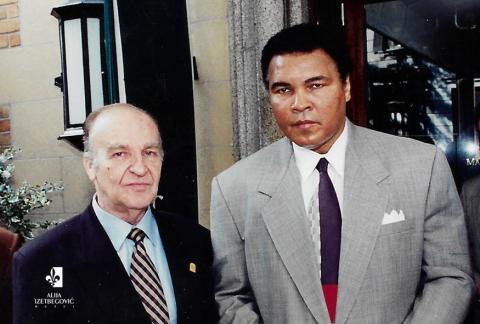How Bosniaks Embraced Muhammad Ali

The Cepalo family was not the only one cutting short their sleep. In fact, Fatima Cizmic recalls the whole of Prusac doing the same. Yet this was no religious ritual or tradition. The reason was far simpler: Muslim Bosniaks like the Cepalo family were waking up to watch Muhammad Ali fight, but the time differences meant he almost always entered the boxing ring late at night.
My mother Hamida, then around 10 years old, remembers being woken up by her parents, Ahmet and Emina. The children bleary-eyed, Hamida recalls how the whole household was up before the fight began. So were the neighbours, and the entire street. And everybody was hoping and praying that Ali would win.
At the same time, in the eastern Bosnian town of Visegrad, again some 110 km from Sarajevo, the Karcic and Tabakovic were also rousing themselves to watch the boxing legend.
Muslims marginalised in Tito's Yugoslavia
Muhammad Ali (R) and Bosnia's then ambassador at the UN, Muhamed Sacirbey (L), 1995. Photo: Courtesy of the Alija Izetbegovic Museum in Sarajevo
My late father hailed from a family of observant Muslims in Visegrad. His grandfather, Rasim Tabakovic, was an imam and spiritual leader of the community and his parents were committed to keeping the mosque in the Drina river town working.
Neither the Cepalos in Prusac, nor the Karcics or Tabakovics in Visegrad were particularly enthusiastic about sport. None of them can boast a professional sportsperson even within their extended families. Indeed, sport played no major role in their lives. But they were united, young and old, in rooting for Ali and praying for his success.
The Karcics and Cepalos - my paternal and maternal families respectively - were observant Muslims...
- Log in to post comments
